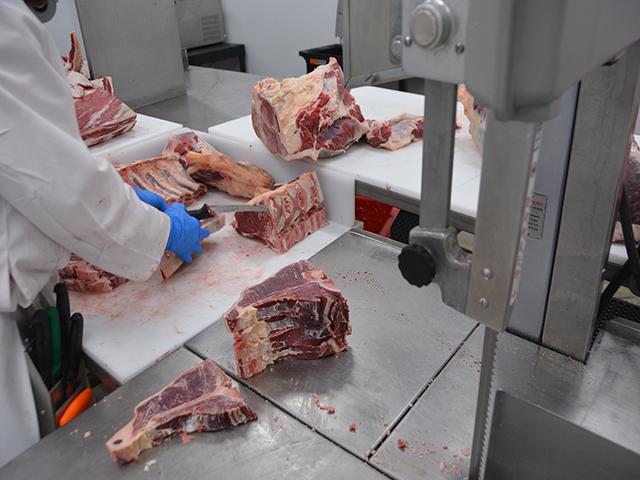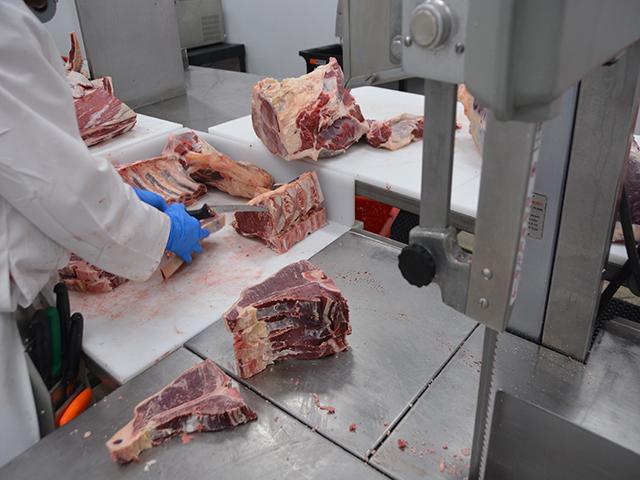Ag Policy Blog
USDA Issues New Rules on Red Meat Purchases, Poultry Contracts and Seed Sales
WASHINGTON (DTN) -- In a series of actions under President Biden's executive order on competition, Agriculture Secretary Tom Vilsack announced Wednesday that all red meat purchased by USDA must be "born, raised and slaughtered" in the United States, that a new rule would require transparency in poultry contracting and that seed companies must provide information to farmers at the point of sale.
Vilsack said that effective immediately all beef, pork, lamb and bison products purchased by USDA's Agricultural Marketing Service (AMS) must come from animals born, raised and slaughtered in the United States. Vilsack said that USDA purchasing rules already must meet "domestic origin requirements" and that "the guidelines for procuring beef, pork, lamb, and bison products were not as clear as other commodities.
"Last year, AMS purchased $800 million worth of meat products. This clarification to the domestic origin requirement will ensure U.S. producers reap the full benefit of USDA purchase programs and recipients of nutrition assistance programs benefit from domestically produced meat products," Vilsack said.
Sarah Little, a spokeswoman for the North American Meat Institute, said, "Segregation of cattle to those born, raised and slaughtered in the U.S. will increase costs and will place the burden on school systems and the taxpayer at a time of great need. We will need to review the policy and the costs of compliance."
A spokesperson for the National Pork Producers Council said the issue would have to be addressed internally within the organization, but Little said, "I can confirm that Canada ships weaner pigs to the U.S."
Vilsack also announced that USDA has created the position of chief competition officer, a new position at AMS to support its multiple efforts to address the many complex competition challenges in the agricultural sector.
The chief competition officer will be within the AMS administrator's office and will "work closely with the current Biden-Harris USDA's leadership on competition policy and will also serve as a career liaison to other federal agencies working to tackle competition issues using a whole-of-government approach," Vilsack said.
POULTRY CONTRACTS
Vilsack also announced the publication of a final rule that requires a Live Poultry Dealer Disclosure Document that provides growers with "information they need to have a better understanding of realistic outcomes they can expect before making important financial decisions, such as capital-intensive facility improvements or taking out loans. In particular, the rule requires that dealers disclose earnings for growers by quintile, establish minimum flock placements, and explain variable costs growers may incur and how companies handle certain important circumstances such as sick flocks and natural disasters. It also establishes an accountability and governance framework that must be certified by the poultry company's CEO."
The rule separately requires dealers provide tournament-specific disclosures of inputs to poultry growers who are paid using a poultry grower ranking system and requires that companies also show the distribution of inputs, housing specifications, and any feed disruptions for all the growers in the tournament, at the time of payment. The names of the growers will not be disclosed to protect their privacy. Under the final rule, live poultry dealers that slaughter fewer than 2 million live pounds of broilers weekly or 104 million pounds annually are exempt from these requirements, provided they do not require additional capital investments.
The final rule will be published in the Federal Register.
P[L1] D[0x0] M[300x250] OOP[F] ADUNIT[] T[]
The National Chicken Council, which represents the broader industry, said that the rule "would have a devastating financial impact on the U.S. chicken industry by raising costs and administrative burdens, opening the floodgates for frivolous litigation, and ultimately destabilizing a successful compensation system for our farmers."
"Make no mistake, this isn't about transparency," said NCC President Mike Brown. "This rule was specifically designed to chum the water for lawsuits. It is just the first salvo in the administration's attempts to resurrect failed policies that would dismantle a successful industry structure that has benefited farmers, chicken companies and ultimately consumers all around the world.
"This is the latest example of Bidenomics pushing increased regulations, red tape and costs onto businesses causing record inflation and input costs, and threatening food security and potentially raising grocery bills even further for Americans," Brown said.
Other groups weighed in supporting the poultry contract rule. The National Sustainable Agriculture Coalition said, "This final rule is an important first step that will shed light on the opaque and unfair poultry tournament system to protect contract poultry growers. Transparency is necessary in any supply chain as a bulwark against anticompetitive or harmful manipulation and abuse of workers -- in this case, growers."
The Campaign for Contract Agriculture Reform (CCAR) applauded the rule.
"The opaqueness of the contract poultry production system is at the heart of the economic abuse and deception inherent in the model," said Steve Etka, CCAR policy director. "By requiring poultry companies to be more honest and business-like with prospective and existing poultry growers, this rule helps to deter that deception and give farmers the information they need to make wise investment decisions. Without a doubt, a full-scale reform of the poultry payment system is needed, but this rule is a very important and welcomed step toward that goal."
But Farm Action President Angela Huffman said, "Today's actions are steps in the right direction, but on the whole, the USDA has not yet made it over the finish line on behalf of America's farmers and ranchers. With time running out to complete the USDA's competition directives, the department must act much more aggressively to rein in monopoly power in the food system.
"The Final Rule on Transparency in Poultry Grower Contracting and Tournaments exemplifies this point. Providing contract growers with additional information about flock sizes and how much they can expect to make is helpful. However, the tournament system is still exploitative, merely offering farmers a take-it-or-leave-it deal. This rule simply shows farmers the terms of their exploitation."
Huffman said USDA should "follow" the Justice Department's lead and "ban the abusive tournament system outright."
SEED INDUSTRY TRANSPARENCY
Finally, Vilsack said AMS had sent letters to seed companies that they must provide variety transparency to farmers at the point of sale, disclosing the variety to growers usually at the time of purchase and no later than the commencement of shipment.
The American Seed Trade Association said, "We appreciate USDA's continued efforts to promote the Federal Seed Act's varietal labeling requirements for seed and for highlighting the importance of establishing best practices under the March 6 Notice to Trade. In May of this year, ASTA held a member webinar where AMS presented and shared the latest information with more than 100 of its members.
"All of ASTA's member companies strive to comply with state and federal seed laws and the labeling requirements set forth by the Federal Seed Act. Our members, large and small, build long-term, trusted customer relationships with their farmers so that the seed they provide is of the best quality possible. Each year, farmers rely on transparent and clear information to make crucial seed choices that support successful harvests and provide for an increasing world population in a sustainable fashion while protecting the environment."
- Final rule: Transparency in Poultry Grower Contracting and Tournaments
-USDA AMS -- Notice to See Trade letter https://www.ams.usda.gov/…
Jerry Hagstrom can be reached at jhagstrom@nationaljournal.com
Follow him on X, formerly known as Twitter, @hagstromreport
(c) Copyright 2023 DTN, LLC. All rights reserved.






Comments
To comment, please Log In or Join our Community .